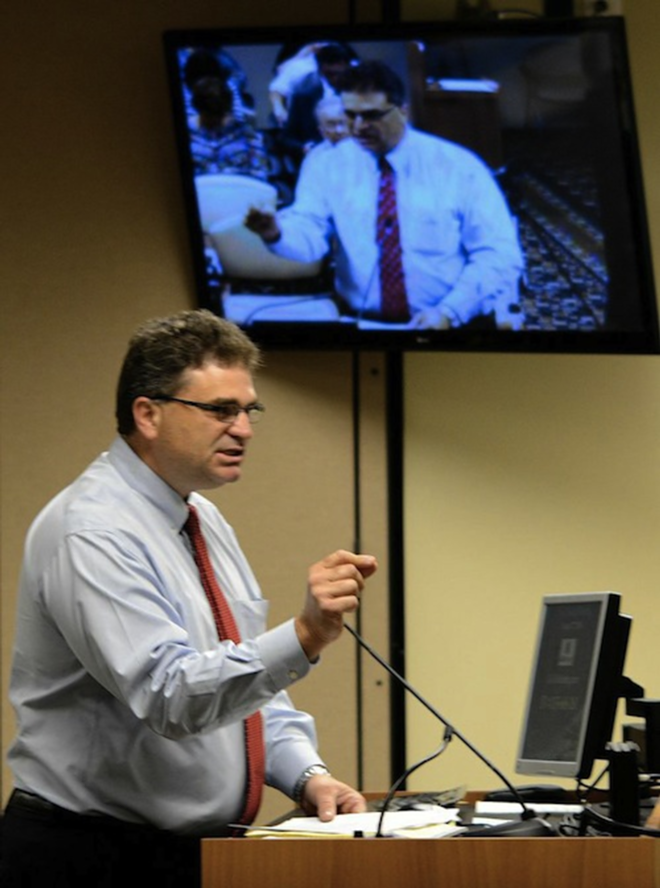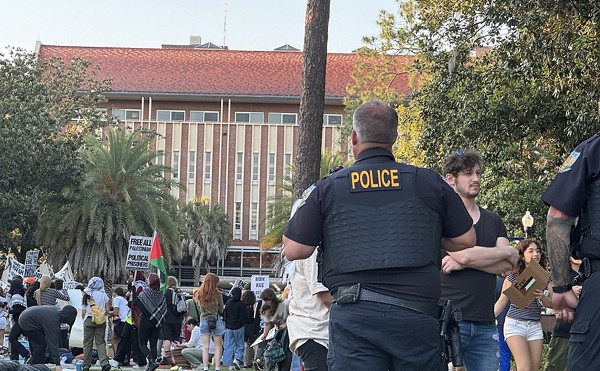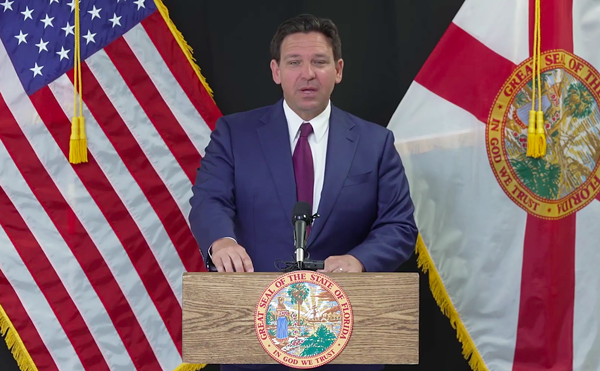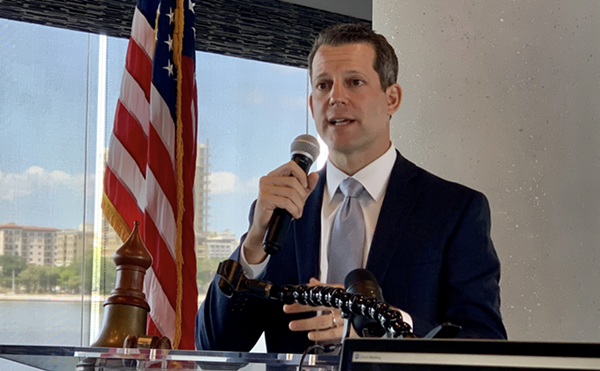Earlier this spring Dr. David McKalip, one of the leading critics of the Greenlight Pinellas transit tax that county voters will decide on this fall, said that he felt something was amiss after watching an ad that PSTA, the Pinellas transit agency, ran with a disclaimer at its conclusion mentioning Department of Homeland Security grant money. He instigated a public records request to learn who made the commercials, then followed up by researching online documents and reviewing PSTA minutes of earlier board meetings. That convinced him that the agency had misspent DHS funds as a back-door way to promote the transit plan.
So he confronted PSTA Executive Director Brad Miller, who denied his charges. Shortly thereafter, ace WTSP investigative television reporter Mike Deeson picked up on McKalip’s work and did his own report. He confronted Miller on camera to answer the charge that it appeared the agency had misused funds to promote the transit agency, which PSTA is explicitly not allowed to do. Again, Miller rejected the allegation.
A couple of days later, the PSTA board met for its monthly June meeting. There, Miller and Welch addressed the issue, with Welch mocking its accuracy. As some Board members talked about demanding a retraction from the local CBS affiliate, Welch simply conceded that critics were going to use such “misinformation” all the way up to the election.
Except it wasn’t misinformation, something that Miller and Welch had to cop to after Homeland Security called on PSTA to return the $354,000 in federal funds after it concluded its own investigation (prompted by an inquiry from Congressman David Jolly).
A minor aberration on the way to Pinellas successfully voting on what its advocates call one of the biggest things to happen to the county, ever? Perhaps. But with trust in government at all-time low levels, the error by an agency asking to raise residents’ taxes played straight into the Tea Party mantra about Big Government run amok.
“It’s unfortunate that political ideology will play a significant role,” says Eckerd College political science professor Tony Brunello, who supports the measure. “So that this sort of skepticism about government could very well blunt the momentum towards getting this done.”
The DHS funding flap marked the second time a government agency has researched whether PSTA has misused its own funds to advocate for the transit tax measure. Earlier this year, an inspector general for the Florida Dept. of Transportation determined that the agency’s $800,000 in expenditures for distributing Greenlight items like pens and necklaces had not violated any laws. Unbowed by the finding, St. Pete-based state Senator Jeff Brandes said he would file legislation next year to require all entities using taxpayer dollars to educate the public to be more transparent and balanced.
David McKalip calls the IG’s report the equivalent of the fox guarding the henhouse. “Taxpayers don’t want money that should go to bus routes to go to propaganda.”
But he was joined by just a handful of like-minded Greenlight critics in denouncing Miller and Welch at PSTA’s annual meeting in late August, the same meeting where the PSTA board later unanimously showed their support for the besieged Miller.
And why not? The night before, noted PSTA critics Tom Rask and Norm Roche were trounced in their contests for County Commission, reflecting perhaps that a candidacy based partly on opposition to the transit tax isn’t a prescription for electoral success — something Welch alluded to in rebuking their criticism.
“We gut-checked as a leadership group and asked, ‘Do we still trust these guys?’” says Chris Steinocher, president of the Greater St. Petersburg Chamber of Commerce and a prominent member of Yes on Greenlight, the political action committee pushing to get the measure approved this fall after the DHS story was reported. “It was unanimous that, yeah, these guys are the real deal. Has it hurt us? Not at all, because we quickly learned in our research ...this isn’t a ballot initiative about ‘Do we trust PSTA?’ This is about ‘Do we want transportation options going forward?’”
The proposal for Pinellas voters includes a tax swap. Currently, PSTA is funded by county homeowners’ property taxes. That brings the agency roughly $32 million a year. The new proposal would end that assessment, and instead add a penny to the county’s existing 7 percent sales tax, estimated to bring in approximately $132 million a year, or approximately $100 million more than current revenues.
Those increased funds would dramatically enhance bus service and lead to the creation of a 16-station light-rail network, running from St. Petersburg to downtown Clearwater, which is expected to begin service by 2024.
The idea of transit-oriented development looms large for Steinocher and other business interests in Pinellas County, long considered the most built-up community in the entire state.Supporters say that part of the pitch isn’t just new transit options, but a revitalization of the entire county.
“It’s an opportunity to hit the reset button in a lot of places where we haven’t been able to hit the reset button,” says Steinocher. “It’s about loving your community a little differently and giving yourself an option to grow again.”
Meanwhile, the Yes on Greenlight campaign continues to flourish financially, at least in comparison to the group opposed to the measure, No Tax for Tracks. At the end of August it had brought in over $774,000 in campaign contributions, including new submissions from all three major-league Tampa Bay sports franchises and the Home Shopping Network. No Tax for Tracks, on the other hand, has taken in less than 10 percent of that amount ($46,103).
But No Tax for Tracks’ Barb Haselden says finances aren’t as crucial to their effort because they rely on volunteer power to generate opposition. “Our message is so much easier to sell than theirs,” she tells CL. “They’re trying to sell this massive tax increase, and that’s a much tougher sell, especially when people see these empty buses running around town.”
As far as public polling goes, it’s been all over the map. Matt Florell with St. Pete Polls has done a number of surveys testing the measure’s popularity, and admits that the results have been different based on how the questions have been posed. A poll they conducted for No Tax for Tracks earlier this week showed the measure down by double digits. But Greenlight’s internal poll taken this summer showed it leading by double digits.
Undoubtedly Greenlight advocates have learned from some of the miscues that resulted in Hillsborough’s failed transit tax proposal in 2010. In a post-referendum analysis prepared by the Hillsborough County Metropolitan Organization, confusion about the plan was prominently mentioned: “Rail plan not finalized, too many missing details was a convincing argument for more than half of ‘no’ voters.”
Steinocher was working with the Tampa Bay Partnership at that time, which was behind Moving Hillsborough Forward, the political action group advocating for the tax. “There was not a physical document that I could walk you through and make you understand ideally where those routes are served,” he says, which is not the case with Greenlight. He says planners brought that proposal forward, while “this was brought to the table by the community.”
That may be a slight exaggeration, as planners have certainly been involved in deciding transit routes.
Earlier this week, No Tax brought in Randal O’Toole, senior fellow national public policy analyst from the Cato Institute, who made similar appearances in Tampa four years ago to rally opposition against the Hillsborough initiative. O’Toole advocates that more bus service — and no rail — is the ticket to a success in Pinellas.
“PSTA has shown its inability to predict short-term travel patterns with bus occupancies below the national average and Greenlight Pinellas’ proposal effectively asks the public to reward the agency for its failures,” he said in a press release announcing his appearance. “PSTA’s plan is so expensive and produces so little benefit that, under federal Department of Transportation rules that were in effect until last year, it would not be eligible for federal funding because it was so cost-ineffective.”
The stakes are great, says the Chamber’s Chris Steinocher:
“I truly believe there’s no bigger vote in the next 50 years that we’re going to make in Pinellas.”
Looking on with intense interest, of course, are those in Hillsborough County who hope that their citizens will have the same opportunity to vote on a transit tax in 2016. Currently, the Transportation for Economic Development group working on a potential referendum is going to the public for feedback about what should be in their plan.
Cynics say the current strategy in Hillsborough actually is to tread water and wait and see what happens in Pinellas.
Kevin Thurman with Connect Tampa Bay says that while there’s the possibility that Hillsborough leaders might reel in their ambitions if Greenlight loses, he doesn’t believe the measure will lose – and thinks it will only enhance a more robust effort if it wins.
“It won’t stop the momentum of something going forward if it doesn’t pass, but passing it will create a tremendous amount of pressure to have transit [here], too,” he says of Hillsborough’s ambitions.
Meanwhile, David McKalip continues to rummage through PSTA documents and report on them in his blog Sunbeamtimes.com. Last week he wrote that New York City transportation consultant Parsons Brinckerhoff, which has donated $50,000 to the Yes on Greenlight campaign, will “look forward to paybacks later if it passes.”
Hillsborough County Commissioner Mark Sharpe was a major advocate for the 2010 transit tax, and remains one of the strongest elected officials pushing for a 2016 ballot measure in his county. He says one thing he’s learned from Greenlight’s campaign is the importance of keeping citizens fully informed. “Citizens are smart, “ he says. “They can decide for themselves. But part of our job is to make sure that we provide the information as quickly as possible, so people feel comfortable, no matter which way they decide.”
















